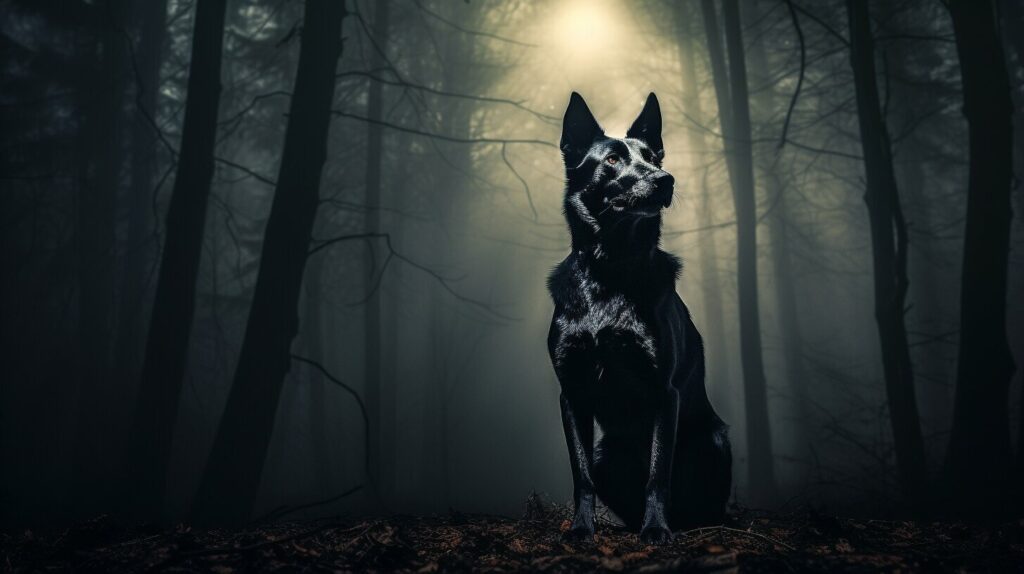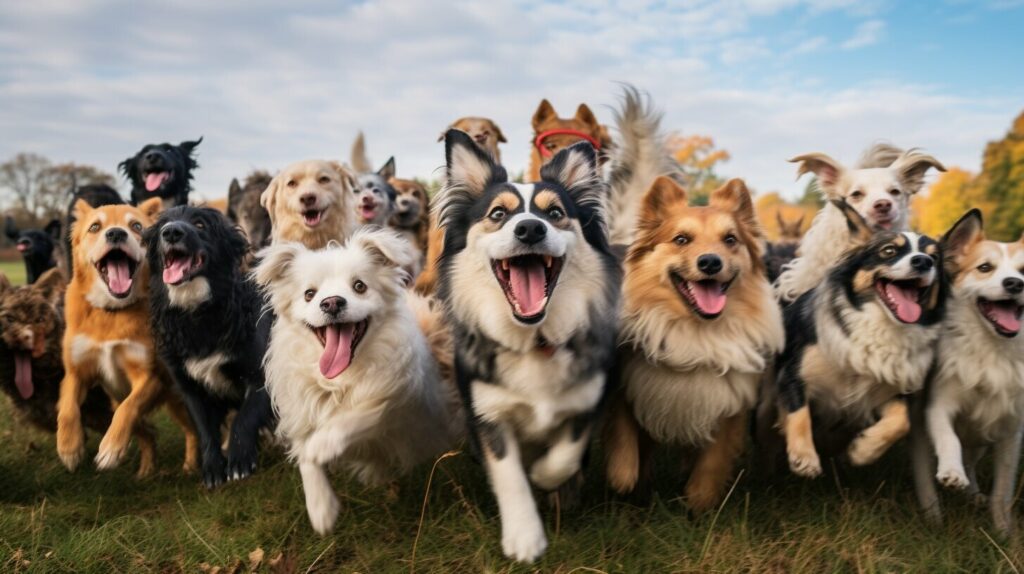Black dogs are often overlooked in animal shelters and adoption centers, but they have a unique charm that is waiting to be discovered. Understanding black dogs, their breeds, and the adoption process is key to providing them with loving homes.
Black dogs come in a variety of breeds, from large to small, and have unique traits that make them wonderful pets. However, they have also been subject to negative stereotypes and superstitions, which is why it is important to shine a light on the truth about these beautiful animals.
If you are considering adopting a black dog, it is important to educate yourself on the process and the specific needs they may have. Black dog adoption is a rewarding experience that can bring joy to both you and your new furry family member.
Key Takeaways:
- Black dogs have a unique charm that is waiting to be discovered
- Understanding black dog breeds and the adoption process is important for providing them with loving homes
- Black dogs come in a variety of sizes and have unique traits that make them wonderful pets
- There are common misconceptions about black dogs that need to be addressed with factual information
- Adopting a black dog requires education on their specific needs, such as training and care
The Allure of Black Dogs
Black dogs are captivating creatures that capture the hearts of many. Their dark, shiny coat adds to their allure, and their loyal and affectionate nature makes them excellent companions. Whether you prefer large black dogs or small black dogs, they all have their strengths and unique traits.
Large black dogs, such as the Black Russian Terrier or the Great Dane, are often known for their imposing size and protective nature. They can make excellent guard dogs and are often quite intelligent. On the other hand, small black dogs like the Miniature Schnauzer or the Toy Poodle are playful and energetic, making them perfect for families with children.
But it’s not just their size and personality that makes black dogs so alluring. They have also been the subject of many myths and legends throughout history. In some cultures, black dogs were seen as protectors and were even worshipped. In others, they were believed to be omens of bad luck or even companions of the devil. Nonetheless, the charm of black dogs persists and continues to inspire people around the world.
Popular Black Dog Breeds
Black dogs come in various breeds, each with their unique characteristics and temperaments. Two of the most popular breeds in black are Black Labrador Retrievers and Black German Shepherds.
| Breed | Characteristics | Temperament |
|---|---|---|
| Black Labrador Retriever | Strong, muscular, and agile. | Friendly, outgoing, and loyal. |
| Black German Shepherd | Powerful, sturdy, and fearless. | Courageous, intelligent, and protective. |
Both breeds make excellent family pets, but it is essential to understand their unique traits to ensure compatibility with your lifestyle and preferences. Black Labradors are typically friendly and outgoing, while Black German Shepherds are more protective and reserved.
If you are considering adopting a black dog, it is essential to research and research the specific breed to choose the one that best suits your lifestyle and needs. Adopting a pet is a long-term commitment, and it is crucial to ensure that you are ready for the responsibility.
Debunking Common Misconceptions about Black Dogs
Black dogs are often associated with superstitions and negative stereotypes, but many of these misconceptions are simply not true. It’s important to understand the facts so you can make informed decisions about adopting a black dog.
Myth: Black dogs are more aggressive
There is no evidence to suggest that black dogs are more aggressive than dogs of other colors. Aggression is a result of many factors including genetics, environment, and training. Black dogs are just as capable of being well-behaved and loving pets as dogs of any other color.
Myth: Black dogs are harder to see at night
While it may be true that black dogs are harder to see at night than lighter colored dogs, this doesn’t mean they are a safety risk. You can use reflective collars, leashes, and vests to make your black dog more visible, and it’s always a good idea to walk your dog in well-lit areas.
Myth: Black dogs are bad luck
This superstition likely originated from the association of black cats with bad luck, but there is no reason to believe that black dogs are any different from dogs of other colors. In fact, many cultures around the world consider black dogs to be a symbol of good luck and protection.
Myth: Black dogs are unadoptable
Unfortunately, black dogs are often overlooked for adoption in shelters due to these misconceptions. However, choosing a pet based on their color is not a responsible or logical decision. Black dogs can make wonderful pets and are just as deserving of loving homes as any other dog.
It’s important to approach black dog adoption with an open mind and an understanding of the facts. Don’t let these common myths prevent you from giving a black dog a chance at a happy life with a loving family.
Adopting a Black Dog: What You Need to Know
If you’re considering adopting a black dog, there are a few things you need to keep in mind. These dogs are just like any other dog, but there are some unique factors to consider when bringing a black dog into your family.
Black Dog Adoption
When it comes to black dog adoption, it’s important to understand that these dogs often face discrimination due to superstitions and negative stereotypes. However, black dogs can make wonderful companions and are just as worthy of adoption as any other dog. Don’t let the color of their fur deter you from providing a home for a black dog in need.
Black Dog Training
Training is important for any dog, and black dogs are no exception. They can be trained just as effectively as any other breed, but it’s important to be aware of their specific training needs. Black dogs can be prone to anxiety, so positive reinforcement training methods are especially effective. Consistency and patience are key when training a black dog.
Black Dog Care
Caring for a black dog is much like caring for any other dog. You’ll need to provide them with regular exercise, a healthy diet, and plenty of love and attention. However, it’s important to be aware that black dogs are more susceptible to skin issues, as they may be more sensitive to the sun’s rays. You’ll need to take extra care to protect your black dog’s skin by providing shade and using protective clothing or sunscreen when necessary.
By keeping these factors in mind, you can make a fully informed decision about adopting a black dog. With proper training and care, black dogs can make wonderful, loyal companions for years to come.
Training and Socializing Black Dogs
Black dogs, like any other breed, require adequate training to ensure they are well-behaved and obedient. However, black dogs tend to face unique challenges when it comes to socialization and training due to common misconceptions and superstitions associated with their color.
It is essential to start training your black dog at a young age, preferably when they are still puppies. Early training will help them learn and establish good behavior habits. A well-trained and socialized black dog can make an excellent companion and family pet.
Training Tips for Black Dogs
Here are some essential tips to keep in mind while training your black dog:
- Use positive reinforcement techniques such as rewards and praise to encourage good behavior.
- Be patient and consistent in your training approach.
- Provide ample exercise and mental stimulation to prevent boredom and destructive behavior.
- Teach basic obedience commands such as “sit,” “stay,” and “come.”
- Consider using a professional dog trainer if needed.
Socializing Black Dogs
Black dogs may face challenges in socialization due to misconceptions about their color. However, socialization is critical to ensure your black dog can confidently interact with people and other animals.
The following tips can help you socialize your black dog:
- Expose your black dog to different environments, sounds, and experiences to help them adapt to new situations.
- Encourage positive interactions with other dogs and people.
- Ensure your black dog is up to date on vaccinations to prevent diseases.
- Consider enrolling your dog in socialization classes.
Proper training and socialization are important for your black dog’s well-being and ensure they can live harmoniously with their owners and the community.
Caring for the Health of Black Dogs
As a black dog owner, it’s important to prioritize the health and well-being of your furry friend. Regular vet visits, proper nutrition, and exercise are key to ensuring a happy and healthy black dog.
Common Health Issues
Black dogs are prone to certain health issues, such as skin problems and dental issues. It’s important to keep an eye out for any signs of discomfort or abnormal behavior and address them promptly.
| Common Health Issues for Black Dogs |
|---|
| • Skin allergies and infections |
| • Dental problems such as gum disease and tooth decay |
| • Joint issues including arthritis and hip dysplasia |
Preventive Care
To minimize the risk of health issues, ensure your black dog receives regular preventive care. This includes vaccinations, dental cleanings, and flea and tick prevention.
- Regular vet check-ups at least once a year
- Daily teeth brushing to promote dental health
- Flea and tick preventive treatment to prevent infestations
- Regular exercise and a healthy diet to maintain a healthy weight and promote overall well-being
Tips for Maintaining Overall Health
In addition to regular vet visits and preventive care, there are several steps you can take to maintain your black dog’s overall health:
- Provide a comfortable and safe living environment
- Regularly groom your black dog to prevent skin and coat issues
- Monitor your black dog’s diet and make sure they are getting proper nutrition
- Stay up to date on your black dog’s vaccinations and parasite prevention
By prioritizing your black dog’s health, you can ensure a long and happy life with your beloved companion.
Black Dogs in Pop Culture
Black dogs have made a significant impact in popular culture, appearing in movies, books, and even as symbolic figures. From Harry Potter’s loyal companion, Padfoot, to Disney’s playful pup, Pluto, black dogs have captured the hearts of audiences.
One of the most iconic black dogs in pop culture is the titular character from the book and movie, “The Hound of the Baskervilles.” The black, ghostly hound is a symbol of the curse that haunts the Baskerville family.
Black dogs have also been portrayed in a positive light, such as the beloved black Labrador, Marley, from the book and movie “Marley and Me.” Marley’s boisterous nature and unwavering loyalty made him a fan favorite.
Black dogs have even been used as a symbolic representation of the Black Dog Syndrome phenomenon. The term refers to the tendency for black dogs to be adopted less frequently than dogs of other colors. This issue has been highlighted in several movies and documentaries, including “One Nation Under Dog” and “Through a Dog’s Eyes.”
Despite the superstitions associated with black dogs, their representation in pop culture has helped to dispel myths and promote their unique charm.
The Beauty of Black Dogs – A Visual Tour
Black dogs come in all shapes and sizes, each with their own unique charm and beauty. From large breeds like the Black Russian Terrier to smaller breeds like the Affenpinscher, black dogs are truly a sight to behold. Here are some of the most striking black dog breeds:
| Breed | Appearance | Temperament |
|---|---|---|
| Black Labrador Retriever | Large, muscular body with a short, dense coat that is always black. | Intelligent and friendly, with a love of water and retrieving. Ideal for families and active owners. |
| Black German Shepherd | Taller and more streamlined than the standard German Shepherd, with a black, medium-length double coat. | Intelligent, loyal, and protective. May require more training and socialization than other breeds. |
| Black Poodle | Curly, dense coat that is always black. Comes in three sizes: Standard, Miniature, and Toy. | Intelligent, energetic, and highly trainable. Ideal for owners looking for a hypoallergenic dog. |
| Black Great Dane | One of the largest breeds, with a muscular body and a short, smooth black coat. | Gentle giants, known for their loving demeanor and affectionate nature towards their owners. Ideal for families with older children. |
These are only a few of the many stunning black dog breeds out there. Whether you prefer a large dog or a small one, a playful pup or a loyal companion, there is sure to be a black dog breed that captures your heart.
Conclusion
Black dogs are a unique and captivating breed that deserve more appreciation and understanding. Throughout this article, we have explored the charm and allure of black dogs, the most popular breeds, and addressed common misconceptions.
If you are considering adopting a black dog, it is important to understand their specific training and care needs. By providing love, care, and positive reinforcement, you can ensure your black dog thrives and stays healthy.
Black dogs have also made a positive impact in popular culture, breaking negative stereotypes and becoming symbols of loyalty and strength.
In conclusion, black dogs are a wonderful addition to any family and deserve love and care like any other dog breed. Consider adopting one today and uncover the unique charm and beauty of black dogs.
FAQ
Q: What are some common misconceptions about black dogs?
A: There are several common misconceptions about black dogs, such as the belief that they are associated with bad luck or are more aggressive. However, these are just superstitions and have no basis in reality. Black dogs are just as loving and friendly as dogs of any other color.
Q: Are black dogs more difficult to adopt?
A: Unfortunately, black dogs tend to have a harder time getting adopted compared to dogs of other colors. This is known as “black dog syndrome,” where black dogs are often overlooked in shelters. However, this is purely a visual bias, and black dogs make wonderful companions just like any other dogs.
Q: What should I consider when adopting a black dog?
A: When adopting a black dog, it’s important to consider their specific training and care needs. Black dogs may be more prone to overheating in hot weather due to their dark fur, so proper shelter and hydration are essential. Additionally, black dogs may require more frequent grooming to manage shedding and keep their coat healthy.
Q: Are there any health concerns specific to black dogs?
A: There are no specific health concerns unique to black dogs. However, like any other dogs, they may be prone to certain conditions such as hip dysplasia or obesity. It’s important to provide regular veterinary care, a balanced diet, and plenty of exercise to ensure their overall health and well-being.
Q: How can I effectively train and socialize a black dog?
A: Training and socialization are important for all dogs, regardless of their color. Positive reinforcement methods, consistency, and patience are key when training a black dog. It’s also beneficial to expose them to various environments, people, and other animals from a young age to help with socialization.
Q: What are some popular black dog breeds?
A: Some popular black dog breeds include black Labrador Retrievers, black German Shepherds, and black Doberman Pinschers. These breeds are known for their intelligence, loyalty, and versatility as working dogs or family pets.



